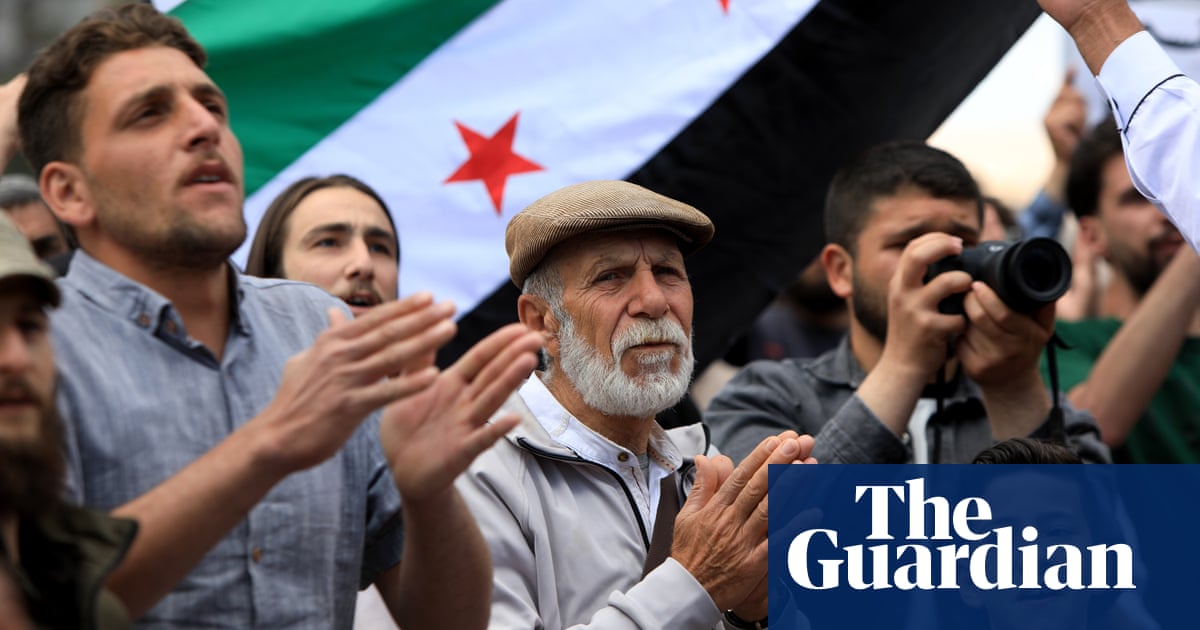Israeli warplanes have carried out a series of airstrikes outside Damascus and across Syria, after warnings from Israeli officials that the country would intervene to protect the Syria’s minority Druze sect.
The airstrikes targeted a Syrian military site in the Damascus suburb of Harasta, as well as hitting unknown targets in Deraa province in southSyriaand Hama province in north-west Syria. At least one civilian was killed and four people were injured as a result of the Israeli bombings late Friday night, according to Syrian state media.
The latest round of strikes come after Israel killed four civilians earlier on Friday in a bombing in southern Syria and struck the vicinity of Syria’s presidential palace.
Syria’s new rulers hadangrily denounced the raids launched by Israel’s air force against unidentified targets near the presidential palace earlier in the day, warning of a “dangerous escalation”.
Syria’s presidency called the strike “a dangerous escalation against state institutions and its sovereignty” and accused Israel of destabilising the country.
Israeli officials said the attacks were intended to send a message to the Syrian government after days of bloody clashes near Damascus between pro-government militia forces and fighters from the Druze minority sect.
Benjamin Netanyahu, Israel’s prime minister, and the defence minister, Israel Katz, said in a joint statement that the attack early on Friday, the second this week in Syria, was intended to deter the country’s new leadership from any hostile move against the Druze.
“This is a clear message to the Syrian regime. We will not allow the deployment of forces south of Damascus or any threat to the Druze community,” the statement said.
The Israeli army confirmed in a statement that fighter jets struck near to the area of the palace of the president, Ahmed al-Sharaa, in Damascus but gave no further details.
Israel has said that it will protect the Druze religious minority in Syria, a declaration that most Druze leaders have rebuffed.
The head of the UN Independent International Commission of Inquiry on Syria condemned the Israeli strikes in an interview with Al Jazeera on Friday.”The Israeli attacks on Syria are absolutely unacceptable. There is nothing in international law that allows for pre-emptive bombing,” said Paulo Sérgio Pinheiro, the chair of the commission.
The government in Damascus took power after ousting Bashar al-Assad in December last year and is dominated by the militant group Hayat Tahrir al-Sham, which has its roots in the al-Qaida jihadist network. Though Syria’s new rulers have promised inclusive rule in the multi-confessional, multi-ethnic country, they face pressures from extremists within their own ranks.
Clashes broke out in Druze-majority areas outside Damascuson Tuesday after an audio clip circulated on social media of a man making derogatory comments about the prophet Muhammad. The clip, which was falsely attributed to a Druze cleric, angered many Sunni Muslims, but may have been fabricated.
On Thursday, one of the three Syrian Druze spiritual leaders, Sheikh Hikmat al-Hijri, accused Syria’s government of what he called an “unjustified genocidal attack” on the minority community.
Hijri released a statement calling for international protection for the Druze in southern Syria, asking international forces to “intervene immediately”. The two other Syrian Druze religious leaders chose to negotiate with Damascus directly and rejected calls for international intervention in Syria.
Sign up toGlobal Dispatch
Get a different world view with a roundup of the best news, features and pictures, curated by our global development team
after newsletter promotion
A UK-based monitoring group, the Syrian Observatory for Human Rights, said 56 people in Sahnaya and the Druze-majority Damascus suburb of Jaramana were killed, including local armed fighters and security forces.
The Druze religious sect began as a 10th-century offshoot of Ismailism, a branch of Shia Islam. More than half of the roughly 1 million Druze worldwide live in Syria, largely in the southern Sweida province and some suburbs of Damascus.
Most of the other Druze live in Lebanon and Israel, including in the Golan Heights, which Israel captured from Syria in the 1967 war and annexed in 1981.
The Syrian government has denied that any of its security forces were involved in the clashes with the Druze, which followed a wave of massacres in March whensecurity forces and allied groups killed more than 1,700 civilians, mostly from Bashar al-Assad’s Alawite community, according to the Syrian Observatory for Human Rights.
Since the fall of Assad’s regime in December, Israel has launched repeated airstrikes on Syria, destroying military hardware and stockpiles, in what it says is defence of the Druze. Israel has also sent troops to what was a demilitarised zone in the Golan Heights, on Syria’s south-west border with Israel, seizing key strategic terrain where Syrian troops were once deployed.
Analysts in Israel say the strategy aims to undermine the new Syrian government while also protecting and so co-opting a potential proxy ally within the country. The strategy is controversial, however, with some officials arguing that a stable Syria would better serve Israel’s interests.
The Syrian president, Sharaa, told a visiting US congressman last week that Damascus wanted to normalise ties with Israel.
